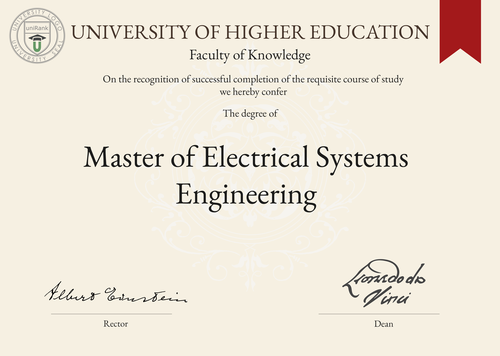
Master of Electrical Systems Engineering (M.E.S.E.)
Guide to Master of Electrical Systems Engineering Program/Course/Degree
Master of Electrical Systems Engineering (M.E.S.E.)

Program Name:
Master of Electrical Systems EngineeringProgram or Degree abbreviation:
M.E.S.E.Duration range:
The duration of the program typically ranges from 1 to 2 years.Tuition range:
The tuition fees for the program can vary depending on the chosen country or university. It is recommended to check with specific institutions for accurate information.Overview:
The Master of Electrical Systems Engineering program is designed to provide students with advanced knowledge and skills in the field of electrical systems engineering. It focuses on the study of electrical power systems, renewable energy, control systems and electrical infrastructure.Curriculum Overview by year:
The curriculum is structured to cover both theoretical and practical aspects of electrical systems engineering. The coursework is typically divided into the following areas: Year 1: - Advanced Power Systems Analysis - Control Systems Design - Renewable Energy Systems - Electrical Infrastructure Planning - Research Methodology Year 2: - Advanced Topics in Electrical Systems Engineering - Project Management in Electrical Engineering - Elective Courses (varies by university)Key Components:
The key components of the program include in-depth study of electrical power systems, renewable energy technologies, control systems design and electrical infrastructure planning. Students also gain practical experience through laboratory work, research projects and industry internships.Career Prospects:
Graduates of the Master of Electrical Systems Engineering program have a wide range of career opportunities in various industries. They can work as electrical systems engineers, power systems analysts, renewable energy consultants, control systems designers and project managers in both public and private sectors.Salary Expectations:
The salary expectations for graduates of the program can vary depending on factors such as location, industry and level of experience. Generally, electrical systems engineers earn competitive salaries with potential for growth and advancement. For a more accurate understanding of salary expectations, you can utilize the Job Sites Search Engine, from our sister site jobRank, which searches over 4,600 job sites worldwide. Make sure to specify not only the job title but also the country you are interested in.Conclusions:
It is important to note that the duration, tuition fees, curriculum, key components, career prospects and salary expectations of the Master of Electrical Systems Engineering program can vary based on the chosen country or location of study, as well as the specific university offering the program. Prospective students are advised to research and compare different options to find the best fit for their academic and career goals. Visitors interested in pursuing a Master of Electrical Systems Engineering degree can use the uniRank World Universities Search Engine to explore universities offering this program worldwide.World Universities Search Engine
search for Master of Electrical Systems Engineering (M.E.S.E.) and add the Location (country, state etc.) or specific University you are interested in studying at.
Query examples:
- Master of Electrical Systems Engineering (M.E.S.E.) United States
- Master of Electrical Systems Engineering (M.E.S.E.) United Kingdom online
- Master of Electrical Systems Engineering (M.E.S.E.) Australia international students
- Master of Electrical Systems Engineering (M.E.S.E.) University of California
- Master of Electrical Systems Engineering (M.E.S.E.) University of London tuition fees
- Master of Electrical Systems Engineering (M.E.S.E.) University of Sydney scholarships
Share Program/Course
Interesting? Share this program/course/degree info with your friends now.